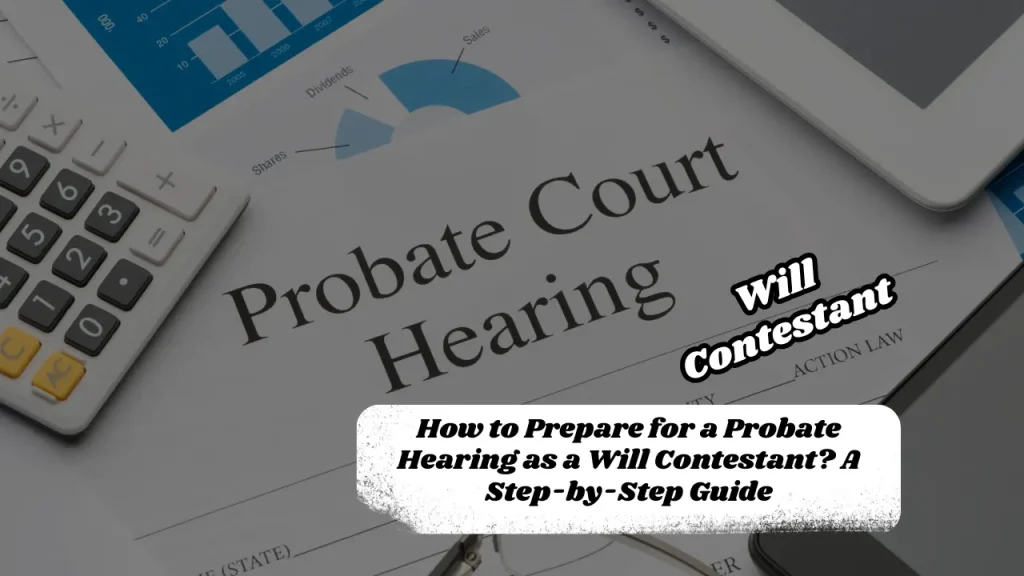How to Prepare for a Probate Hearing as a Will Contestant? A Step-by-Step Guide
Challenging a will in probate court can be a complex and emotional process. If you believe a will is invalid due to undue influence, lack of capacity, fraud, or improper execution, you have the right to contest it. However, contesting a will requires strong legal arguments, compelling evidence, and thorough preparation. This guide will help you navigate the probate hearing process step by step, ensuring you build a solid case and maximize your chances of success.
Your Legal Grounds for Contesting a Will
Before contesting a will, you must establish valid legal grounds. The most common reasons include:
- Lack of Testamentary Capacity – The testator (the person who made the will) was not of sound mind at the time of signing.
- Undue Influence – The testator was coerced or manipulated into changing their will.
- Fraud or Forgery – The will was altered, forged, or signed under false pretenses.
- Improper Execution – The will was not signed or witnessed according to state laws.
- Existence of a More Recent Will – A newer, legally valid will supersedes the contested one.
For example, in Connecticut, lack of capacity requires proof the deceased did not understand the will’s provisions at the time of signing
Filing a Will Contest
To file a contest, contestants must submit a formal petition, often called a “Petition to Contest Will” or “Objection to Probate,” which includes:
- The contestant’s name and contact information.
- The grounds for contest, such as fraud, undue influence, lack of capacity, or improper execution.
- Supporting documentation, such as medical records, previous wills, or witness statements.
- Whether the contestant seeks to invalidate the will entirely or specific provisions.
For instance, in Florida, the contest must be filed within 90 days after the notice of administration is served, with claims barred after two years from the decedent’s death.
Related article for you:
How to Prepare for a Probate Hearing as a Creditor? A Step-by-Step Guide

Step-by-Step Guide to Preparing for a Probate Hearing
Step 1: Consult an Estate Attorney
Contesting a will is a legal battle that requires expert guidance. A probate attorney will:
- Evaluate the strength of your case.
- Help gather necessary evidence.
- Represent you in court.
Step 2: Gather Supporting Evidence
Your case will depend on the evidence you present. Consider collecting:
- Medical records (to prove mental incapacity if applicable).
- Witness testimonies (from caregivers, family members, or attorneys involved in the will drafting process).
- Financial records (to detect any suspicious transactions).
- Prior wills or legal documents that contradict the contested will.
Step 3: File a Will Contest Petition
To formally contest a will, you must:
- Submit a written objection to the probate court within the legal deadline (varies by state).
- Outline your reasons for contesting.
- Serve notice to the estate executor and all interested parties.
Step 4: Prepare for the Discovery Process
Discovery is the phase where both parties exchange evidence and take depositions. Be prepared to:
- Answer interrogatories (written legal questions).
- Provide documentation supporting your claims.
- Attend depositions where witnesses testify under oath.
Step 5: Attend Mediation (If Required)
Some states require mediation before a full probate trial. Mediation allows parties to negotiate a settlement, potentially avoiding a costly and lengthy court battle.
Step 6: Present Your Case at the Probate Hearing
If mediation fails, your case will proceed to a probate hearing. During the hearing:
- Your attorney will present arguments and evidence.
- Witnesses may be called to testify.
- The judge will evaluate all evidence and make a ruling.
Step 7: Understand Potential Outcomes
The judge may:
- Uphold the contested will.
- Declare the will invalid and revert to an earlier will or intestacy laws.
- Order a partial distribution of assets based on legal findings.
FAQs
Who can contest a will?
Only interested parties—such as heirs, beneficiaries, or individuals who would inherit under intestacy laws—can challenge a will.
How long do I have to contest a will?
Deadlines vary by state but typically range from a few months to one year after the will enters probate.
What are my chances of winning a will contest?
Success depends on the strength of your evidence. Cases with clear fraud, coercion, or improper execution have higher chances of winning.
Final Thoughts
Contesting a will is a significant legal challenge that requires thorough preparation and expert legal counsel. By understanding the process, gathering strong evidence, and presenting a compelling case, you can increase your chances of success in probate court. If you suspect a will is invalid, take immediate action to protect your rights and the estate’s integrity.
About the Author

Sarah Klein, JD, is an experienced estate planning attorney who has helped clients with wills, trusts, powers of attorney, and probate matters. At All About Lawyer, she simplifies complex estate laws so families can protect their assets, plan ahead, and avoid legal headaches during life’s most sensitive moments.
Read more about Sarah
